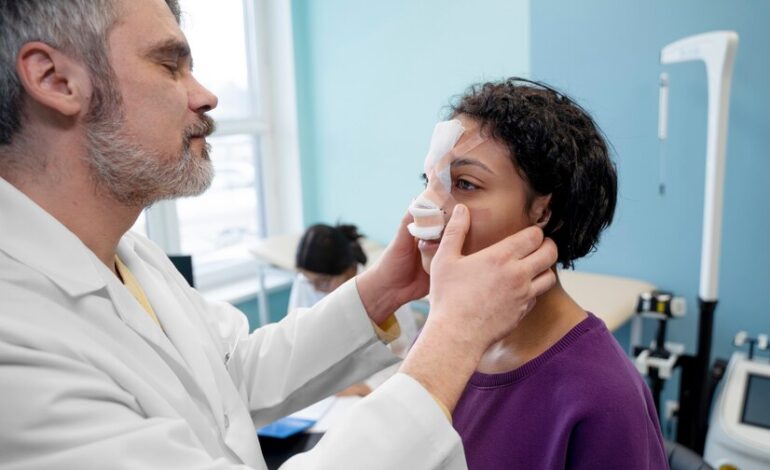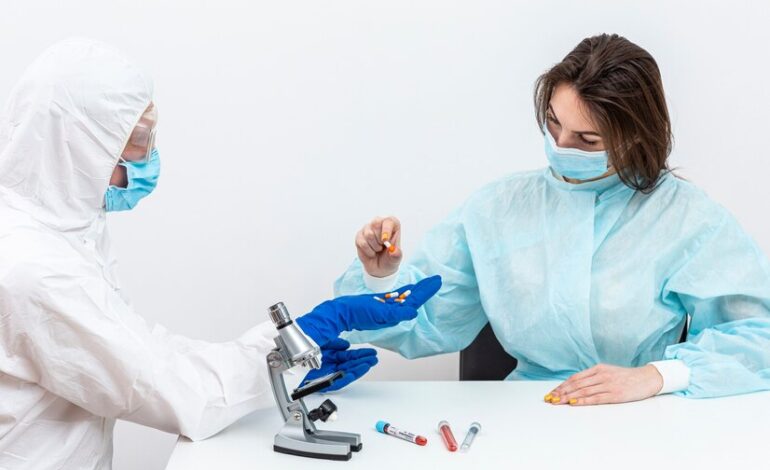Can a Deviated Nasal Septum Be Treated Without Surgery?

Non-surgical treatments can help manage symptoms of a deviated nasal septum, but surgery may be required for long-term relief in severe cases. Consulting an ENT specialist is key to determining the best option.
A deviated nasal septum (DNS) is a condition where the thin partition that divides the two nasal passages is bent or shifted, causing breathing problems, recurrent sinus infections, and sometimes snoring or sleep apnea. Although most people have minor abnormalities that do not affect their functioning, severe abnormalities may require treatment. The primary treatment for DNS is surgical intervention, but many people wonder if there are non-surgical treatments for the condition. Let’s discuss whether it is possible to manage DNS without surgery and when surgery may be required.
Causes and Symptoms of DNS
A deviated nasal septum can develop gradually or suddenly, impacting nasal airflow and overall comfort. A deviated nasal septum can result from various causes:
- Congenital: Some people are born with a deviated septum.
- Injury: Trauma, such as a broken nose, can cause the septum to shift.
- Ageing: As cartilage weakens with age, the septum can gradually shift.
The common symptoms of DNS include:
- Difficulty breathing through one or both nostrils
- Frequent nosebleeds
- Sinus infections
- Snoring or sleep apnea
- Facial pain due to nasal pressure
Non-surgical Treatments for DNS
For severe DNS, septoplasty is advised, but there are non-surgical options that can alleviate the symptoms. These options are aimed at minimising inflammation, improving airflow, and relieving pain.
1. Nasal Decongestants
Nasal decongestants can help reduce the swelling of the blood vessels in nasal tissues thus allowing one to breathe properly. They come in the form of spray or pills and can give temporary relief. However, using nasal sprays for an extended period may lead to a ‘rebound’ effect, worsening nasal congestion.
2. Antihistamines
Antihistamines are useful in managing allergic reactions and reducing nasal congestion. In case DNS symptoms are aggravated by allergies, the use of antihistamines will help reduce the formation of mucus and improve the airway.
3. Nasal Steroid Sprays
Steroid nasal sprays work to reduce inflammation and swelling, thus helping to clear the nasal passages. These sprays are safe for long-term use but may take a few days to give the best results.
4. Saline Irrigation
A saline solution when administered through a ‘neti pot’ or nasal spray can help in rinsing out mucus and other irritants hence relieving congestion in the short-term. This method is quite useful in ensuring that the nasal passages are clean and free from any blockage that may hinder free flow of air.
5. Breathing Exercises
Some of the breathing techniques can help one to breathe through the blocked nostril. Although these exercises do not correct the deviated septum, they may alleviate the sensation of congestion and assist you in adjusting to breathing through one nostril.
When is Surgery Necessary?
Non-surgical treatments can help manage mild symptoms, but they do not address the anatomical displacement of the septum. In cases of severe DNS, surgery could be the only solution to help the patient breathe properly again.
Septorhinoplasty, the surgery performed to correct the deviated septum, adjusts the septum to enhance breathing and minimise signs like recurrent sinus infections, facial pain and breathing issues at night. The procedure is not very complicated and is usually done on an outpatient basis. The patient is usually able to recover within a few weeks.
If non-surgical treatment options do not work and your symptoms continue, it is advisable to seek advice from the best ENT specialist in Bangalore, such as Dr Sanjay Kumar.
When to Consider Non-surgical vs. Surgical Treatments?
The symptoms of mild DNS can be treated with the help of decongestants, steroid sprays and nasal irrigation but these remedies do not eliminate the cause of the problem. If your breathing difficulties, sinus infections, or sleep disturbances are not relieved through non-surgical treatments, then it is advisable to seek the services of a specialist. Dr Sanjay Kumar, the best ENT specialist in Bangalore, can help guide you through the process and recommend the best course of action for restoring normal breathing and improving your quality of life.





